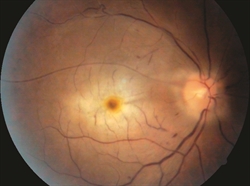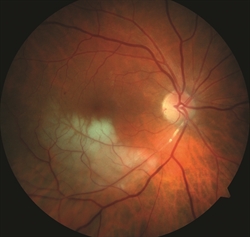Retinal Artery Occlusion

Types of Retinal Artery Occlusion
There are two main types of artery occlusions: branch retinal artery occlusion (BRAO) and central retinal artery occlusion (CRAO). BRAO occurs when a single vessel in the retinal arterial system is blocked, while CRAO involves a blockage of the entire retinal arterial system. The extent of vision loss from an artery occlusion is related to the location within the retina supplied by the artery that is occluded.
Risk Factors & Symptoms

Treatment
There are no clearly effective treatments for retinal artery occlusion. Because the retina is nerve tissue, once its blood supply has been cut off for longer than 90 minutes, even restoring the blood flow to the area will not result in improvement in vision.
The most important aspect of managing an acute artery occlusion is initiating an emergent stroke workup to identify and treat systemic risk factors that put the patient at an increased risk of stroke.
An acute retinal arterial occlusion requires urgent referral to an Emergency Room or hospital, as up to 24% of patients with acute RAO may show signs of a stroke on a brain MRI. The risk of stroke is highest within the first 7 days after the onset of RAO but remains elevated for up to 30 days. Additionally, in patients over the age of 60, emergency testing for a systemic inflammatory condition, Giant Cell Arteritis, must be performed.
Unfortunately, most patients with RAO will be left with permanent partial or complete loss of vision due to irreversible damage to the retinal nerve tissue..
It is important for your eye doctor to continue monitoring patients after an RAO as weeks to months after the RAO, some patients go on to develop abnormal blood growth on either the retina or iris, called neovascularization. These abnormal blood vessels can cause bleeding, retinal detachments, and rapid-onset glaucoma. These complications require urgent treatment to avoid further vision loss and intractable pain.
Conclusion
In summary, RAOs occur when the flow of oxygen-rich blood to the retina is abruptly blocked, leading to rapid and potentially permanent vision loss. Patients with RAO are at high risk of having a stroke and require immediate stroke evaluation.
Schedule a Consultation for Retinal Artery Occlusion
At Mid Atlantic Retina Specialists, our team of experienced retina specialists can diagnose and treat a wide variety of retinal conditions, including retinal artery occlusion. Request an appointment today at one of our retina centers in Hagerstown, MD, Frederick, MD, Chambersburg, PA, or Bedford, PA.

